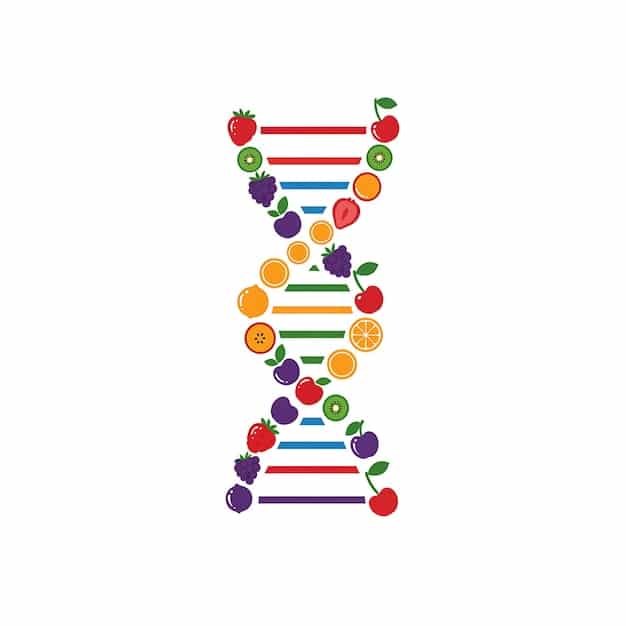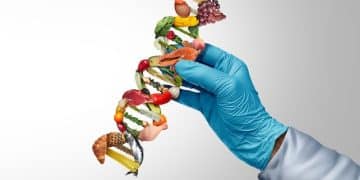Can Nutrigenomics Optimize Your Diet Based on Your Genes?

Nutrigenomics explores how your genes interact with nutrients, suggesting that understanding your genetic markers can potentially optimize your diet for improved health outcomes.
Have you ever wondered why certain diets work wonders for some but fall flat for others? The answer might lie in your genes. Can understanding nutrigenomics optimize your diet for specific genetic markers? Let’s explore how your genetic makeup can influence your nutritional needs and how you can tailor your diet for optimal health.
Decoding Nutrigenomics: The Basics
Nutrigenomics is an emerging field that studies the interaction between genes and nutrients. It explores how your genetic makeup influences your body’s response to food and how nutrients can affect gene expression. Understanding these interactions can help you personalize your diet to optimize your health.
What is Nutrigenomics?
Nutrigenomics examines how nutrients and bioactive food compounds affect gene expression. It aims to provide dietary recommendations based on an individual’s genetic profile, moving away from the one-size-fits-all approach to nutrition.
Key Concepts in Nutrigenomics
Several key concepts underlie nutrigenomics, including genetic variation, gene expression, and nutrient-gene interactions. By understanding these concepts, you can better appreciate how your genes influence your dietary needs.
- Genetic Variation: Differences in genes among individuals can affect how they process nutrients.
- Gene Expression: Nutrients and dietary compounds can influence how genes are turned on or off.
- Nutrient-Gene Interactions: Specific nutrients can interact with certain genes to affect health outcomes.
Nutrigenomics offers a promising approach to personalized nutrition, potentially improving health outcomes by tailoring diets to individual genetic profiles. This emerging field paves the way for more effective and targeted dietary recommendations.

Genetic Markers and Dietary Needs
Genetic markers are specific DNA sequences that vary among individuals and can influence their susceptibility to certain diseases or their response to specific nutrients. Identifying these markers can provide valuable insights into your dietary needs and help you optimize your diet.
Common Genetic Markers
Several common genetic markers have been identified that can influence dietary needs. These markers are associated with various health conditions and can affect how your body processes nutrients.
How Genetic Markers Influence Diet
Genetic markers can influence various aspects of your health, including your ability to metabolize certain nutrients, your risk of developing certain diseases, and your response to specific foods. Understanding these influences can help you tailor your diet to your specific genetic makeup.
- Lactose Intolerance: Variations in the LCT gene can affect your ability to digest lactose.
- Caffeine Metabolism: Variations in the CYP1A2 gene can affect how quickly you metabolize caffeine.
- Folate Metabolism: Variations in the MTHFR gene can affect how you process folate.
By understanding how genetic markers influence your dietary needs, you can make informed choices about your diet and optimize your health. This personalized approach to nutrition can lead to better health outcomes and improved well-being.
Nutrigenomic Testing: What to Expect
Nutrigenomic testing involves analyzing your DNA to identify genetic markers that can influence your dietary needs. These tests can provide valuable insights into how your body processes nutrients and how you can optimize your diet for better health.
Types of Nutrigenomic Tests
Several types of nutrigenomic tests are available, each analyzing different genetic markers and providing different insights into your dietary needs. Understanding the types of tests available can help you choose the one that best suits your needs.
The Testing Process
The process of nutrigenomic testing typically involves providing a DNA sample, which is then analyzed in a laboratory. The results are then provided in a report, which can be used to tailor your diet.
- Sample Collection: Typically involves a saliva sample or blood sample.
- DNA Analysis: The DNA sample is analyzed to identify genetic markers.
- Report Generation: A report is generated, providing insights into your dietary needs based on your genetic profile.
Nutrigenomic testing offers a valuable tool for personalizing your diet and optimizing your health. By understanding what to expect from the testing process, you can make informed decisions about your diet and lifestyle.
Personalized Nutrition Plans Based on Genetics
Personalized nutrition plans based on genetics involve tailoring your diet to your specific genetic makeup. This approach takes into account your genetic markers and provides dietary recommendations based on how your body processes nutrients.
Benefits of Personalized Nutrition
Personalized nutrition plans can offer several benefits, including improved health outcomes, better nutrient absorption, and reduced risk of certain diseases. By tailoring your diet to your genetic makeup, you can optimize your health and well-being.
Building a Personalized Diet Plan
Building a personalized diet plan based on genetics involves identifying your genetic markers and working with a healthcare professional to develop a diet that meets your specific needs. This approach can help you optimize your health and well-being.

To create a personalized nutrition plan, consider the insights gained from nutrigenomic testing alongside expert guidance. Integrating genetic information with dietary recommendations can lead to a more tailored and effective health strategy.
Genetic testing provides a foundation for personalized nutrition, offering insights into how your body processes nutrients and responds to various foods. This information can be leveraged to optimize your diet and improve your overall health.
Ethical and Practical Considerations
While nutrigenomics offers a promising approach to personalized nutrition, it also raises several ethical and practical considerations. These considerations include data privacy, test accuracy, and the potential for misinterpretation of results.
Data Privacy and Security
Nutrigenomic testing involves collecting and analyzing your DNA, which raises concerns about data privacy and security. It is important to choose a reputable testing company that adheres to strict data privacy standards.
Test Accuracy and Reliability
The accuracy and reliability of nutrigenomic tests can vary. It is important to choose a test that has been validated by scientific research and is performed by a reputable laboratory.
- Choose Reputable Companies: Select testing companies with strong reputations and validated tests.
- Consult Healthcare Professionals: Work with healthcare providers to interpret results accurately.
- Understand Limitations: Be aware of the limitations of nutrigenomic testing.
Addressing these ethical and practical considerations is essential for ensuring the responsible and effective use of nutrigenomics in healthcare and nutrition. Staying informed and engaging with experts can help navigate these complexities.
The Future of Nutrigenomics
The future of nutrigenomics looks promising, with ongoing research and technological advancements paving the way for more personalized and effective nutrition plans. As our understanding of the interaction between genes and nutrients grows, nutrigenomics is poised to revolutionize the field of nutrition.
Advancements in Research
Ongoing research is uncovering new genetic markers and their influence on dietary needs. These advancements are helping to refine personalized nutrition plans and improve health outcomes.
Technological Innovations
Technological innovations are making nutrigenomic testing more accessible and affordable. This is allowing more people to benefit from personalized nutrition plans based on their genetic makeup.
The integration of advanced technologies enhances the precision and accessibility of nutrigenomic testing, making personalized nutrition plans more attainable and effective.
Looking ahead, nutrigenomics is expected to play a pivotal role in shaping dietary recommendations and optimizing health outcomes. Continued research and technological advancements will drive the field forward.
| Key Point | Brief Description |
|---|---|
| 🧬 Genetic Markers | Influence nutrient metabolism and health risks. |
| 🔬 Nutrigenomic Testing | Analyzes DNA to identify dietary needs. |
| 🥗 Personalized Diets | Tailor nutrition to genetic profile for better health. |
| 🔒 Ethical Concerns | Address data privacy and test accuracy issues |
Frequently Asked Questions
▼
The main goal of nutrigenomics is to understand how nutrients interact with genes to create personalized dietary recommendations, enhancing health outcomes based on individual genetic profiles.
▼
Genetic markers can influence how your body metabolizes nutrients, affecting your risk for certain diseases and your response to different foods. This knowledge helps tailor your dietary choices.
▼
Nutrigenomic testing involves analyzing your DNA to identify genetic markers that affect your dietary needs, typically through a saliva or blood sample sent to a lab for analysis.
▼
Ethical considerations include data privacy and security, ensuring test accuracy and reliability, and avoiding misinterpretation of results to protect individual rights and ensure responsible use.
▼
The future of nutrigenomics involves ongoing research identifying new genetic markers, and technological innovations making personalized nutrition more accessible and affordable, revolutionizing dietary recommendations.
Conclusion
In conclusion, understanding nutrigenomics and its potential to optimize your diet based on specific genetic markers can revolutionize the way we approach nutrition. While still an emerging field, the insights gained from genetic testing can help tailor dietary recommendations to individual needs, leading to improved health outcomes and a more personalized approach to wellness. As research continues and technology advances, nutrigenomics promises a future where nutrition is precisely tailored to our unique genetic makeup.





